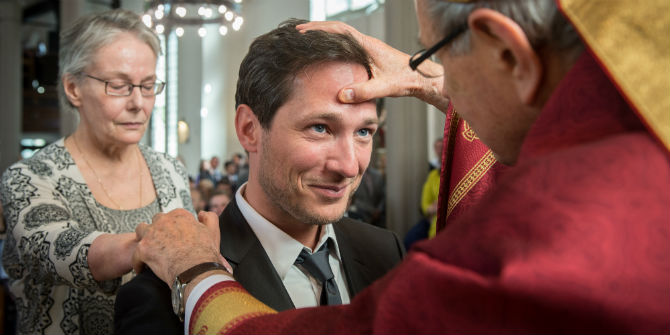The things that really bind EU citizens to the UK may not be the same ones that other people, particularly the authorities, perceive as important. Tiina Sotkasiira (University of Eastern Finland) and Anna Gawlewicz (University of Glasgow) look at the difference between ‘ties that bind’ and ‘ties that count’.
Brexit has a tremendous capacity to influence how EU citizens are made to feel about their lives in the UK. Research demonstrates that it affects their ties to the country, and sense of attachment and belonging – or ‘embedding‘, in academic terms. We have found that Brexit is also politicising EU citizens’ embedding, by creating a problematic hierarchy of what counts as the ‘right’ ties.

The 2016 Brexit referendum triggered a process of introspection among UK-based EU citizens. What is at stake is their right to remain in Britain, including the right to entry, permanent residence, and access to work and social welfare.
We interviewed 42 EU nationals (Finns and Poles) in Scotland about their sense of embedding, or what binds them, in the UK. We wanted to know how media and political debates about Brexit had affected them.
In interviews, most participants presented themselves as well embedded in Scotland and the UK. They spoke at length about the time they had spent in the UK and ways in which they participated in, and contributed to, British society. Many were confident in their right to remain in the UK because they had lived in the country for long, and felt strongly embedded in British society and their local communities. This is reflected in the interview quotes from Kinga and Anna:
I’m kind of optimistic [about the impacts of Brexit]. I think this is related to the fact that I’ve lived here for 11 years. If I’d been here for two years, then I would be worried. But because I’ve been here so long, my kids were born here, I feel nothing should change. Well, I hope so. (Kinga, Poland, 35–40, f)
I have lived here for 17 years and, well, we have a house, a mortgage and I have given birth to two future taxpayers in this country, so I don’t think I will have any problems with that [obtaining citizenship]. (Anna, Finland, 40–45, f)
On the other hand, some participants had serious concerns about their ability to stay in the UK after Brexit. Aili recounts her struggle:
There is still a problem with my background. For my husband, who has worked full time, all the time, it is all very straightforward. (…) For me, having been a part-time student, having worked temporarily and part-time, having been ill a lot and all, it is a really difficult and complex process. Moreover, the timing of our stay in [another EU country] was unfortunate. (Finland, 35–40, f)
Like many others, Aili and her husband had temporarily moved to another EU country and then returned to the UK. In the context of Brexit, this move, alongside Aili’s medical difficulties and precarious employment history, presented them with unforeseen difficulties related to obtaining permanent residency* in the UK.
Aili’s story illustrates how some domains of embedding are being valued more than others. Although participants claimed that social and emotional domains were key for them, they considered economic embedding, preferably through permanent employment, to be the most useful kind. By useful, they meant embedding that enhances their chances of obtaining the right to remain.
Some participants also claimed that they had the ‘right’ kind of ties. They argued that they made contributions to the national economy and for this reason ‘deserved’ to be allowed to remain. Such arguments are very problematic because they present the relationships among migrants as competitive and hierarchical, and create a distinction into ‘deserving’ and ‘undeserving’ migrants, ‘good’ and ‘bad’ migrants.
While other participants were more critical, they also tended to position themselves as those who had a desirable kind of embedding. For instance, Anna (quoted earlier), while being sarcastic in describing herself as a mother of ‘taxpayers’, still saw her family ties, and her role as a mother of UK-born children, as ties that count towards residency.
What this shows is that in the context of Brexit EU citizens are increasingly thinking in terms of ‘ties that count’. ‘Ties that count’ are the social relationships and resources that are useful in justifying the right to remain. The subjectively felt ‘ties that bind’, such as feeling ‘at home’ and sustaining family relations, friendships and other meaningful relationships are clearly not enough. Instead, ‘ties that count’ are needed to demonstrate one’s usefulness to the society.
Realising that she may not possess the ‘right’ kind of ties was particularly emotional for Beata who had followed her husband to the UK with their children. She felt that Brexit had forced her into an extremely precarious position, where she would be subjected to different treatment by the state than the rest of her family:
When Brexit happens, I’ll have only been here for three years. My husband will have been here for five years, so he’ll be able to apply for permanent residency*, but what about me and the rest of the family? What if they tell me that I cannot stay? What if he’s able to stay with the kids and I’m not? (Beata, Poland, 40–45, f)
These kinds of fears, which have been felt and expressed by third-country nationals for decades are now being experienced by EU citizens too.
What is taking place here could be described as politicisation of embedding: an increase in the significance of what is seen as useful and desirable ties in the lives of EU citizens. This process is taking place because EU citizens have increasingly felt under pressure to prove that they are ‘deserving’ of the right to remain in the UK.
The politicisation of embedding also means that more and more actors are drawn into the debate and evaluation of what counts as embedding. In the lives of EU citizens, the boundaries between private and public spheres have become blurred. Their economic, social and family ties are no longer perceived as those that belong within the intimate sphere of personal life. Their lives and relationships are scrutinised in the media, in everyday encounters, in political debates and, most importantly, by state authorities in the process of evaluating EU citizens’ right to remain. Ever since the Brexit referendum, EU citizens have increasingly felt that they are under scrutiny, under microscope – being ‘watched’. This puts pressure on EU citizens to think opportunistically about their embedding: to think in terms of very problematic ‘ties that count’.
Note
*In 2019, the UK government introduced the EU Settlement Scheme requiring all EU citizens living in the UK to apply for the settled or pre-settled status. However, at the time of our research in 2017-2018, EU citizens were advised to apply for ‘permanent residence’.
This post is based on Sotkasiira T & Gawlewicz A (2020) The politics of embedding and the right to remain in post-Brexit Britain. Ethnicities. DOI: 10.1177/1468796820913419. It draws on Anna Gawlewicz’s research project ‘Living together in the context of Brexit: Migrant-‘host’ encounters in the East End of Glasgow’ (2017-2019) funded by the Urban Studies Foundation and interview material collected by Tiina Sotkasiira in 2017, when she spent six months at the University of Glasgow as a Visiting Research Fellow.







I was interested in this article, especially as my partner is German. However, the emphasis in such pieces always tends to be one-sided. Having lived for many years in two different EU countries, where I too was obliged to “prove my worth” as a migrant in order to be granted a perminent esidency permit. To suggest that this is simply a UK “problem” and only due to Brexit is ignoring the reality of many baits in “Europe”.
I was somehow surprised to see the word ‘bait’ used. Is that ‘bait’ as in ‘baiting a trap’?
What I fail to understand though is why the UK never implemented the controls on EU migration that it was entitled to.
This would have both allowed migrants to have legitimate status without having to try & prove it ‘after the event’ It may also have deterred some of the worst excesses of labour & housing market exploitation ‘Sorry Mr Ashley but I wont take a job at your depot in Shirebrook because I need a job with fixed hours at something better than the minimum wage’
While I think that the Blair ID card plan was badly flawed, I fail to understand why the UK cannot create a population register in the way many European Nations have, instead we have the Windrush Generation, the Settled Status shambles and who knows what else yet to come.